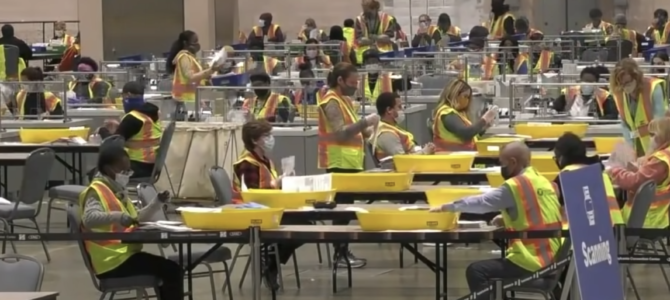Georgia Secretary Of State Explains Why He’s Just Now Discovering More Than 10,000 Illegal Votes Cast In 2020
BY: MARGOT CLEVELAND

During a detailed discussion with The Federalist on Wednesday, representatives from the Georgia Secretary of State’s office provided their perspective on new evidence suggesting more than 10,300 Georgian voters illegally cast ballots in the November 2020 general election.
Last week, The Federalist reported on recently obtained data indicating tens of thousands of Georgia voters had violated Section 21-2-218 of the state’s election code, which requires residents vote in the county in which they reside, unless they had changed their residence within 30 days of the election.
Shortly after the November 2020 election, Mark Davis, the president of Data Productions Inc. and an expert in voter data analytics and residency issues, determined from National Change of Address records that nearly 35,000 Georgia voters who indicated they had moved from one Georgia county to another voted in the 2020 general election in the county from which they had moved.
Kurt Hilbert, one of President Trump’s lead attorneys in the Georgia case, told The Federalist that this category of potentially illegal votes served as one of the 33 categories of voting irregularities underlying the president’s challenge to the Georgia election results. Specifically, in his 64-page complaint accompanied by thousands of pages of sworn affidavits and expert reports filed against the Georgia Secretary of State in early December last year, Trump alleged the state violated 21-2-218 by allowing “at least 40,279 individuals to vote who had moved across county lines at least 30 days prior to Election Day and who had failed to properly re-register to vote in their new county after moving.” The complaint further alleged that the state “improperly counted these illegal votes in the Contested Election.”
Trump’s claims of violations of Section 21-2-218, as well as the numerous other challenges, however, were never heard, Hilbert told The Federalist, because the chief judge of Fulton County, Chris Brasher, failed to appoint a legally eligible judge to hear the case until a month after the lawsuit was filed, making a trial on the president’s election challenge impossible. Then, after a judge was finally appointed late on December 31, the trial was scheduled for January 8 — two days after Congress would open and certify the Electoral College votes. Given the timing of the hearing, which effectively mooted the case, and the Secretary of State’s Office’s promise to meet with his legal team, Trump dropped his lawsuit challenging Georgia’s election.
disenfranchises a legal voter. And what Republicans ignore is the reality that right now Democrats and their partners in the press — under the guise of protecting the right to vote — are poised to push through H.R. 1, which will gut the currently existing, and woefully inadequate, laws that provide a minimal level of protection to voting integrity.
So, yes, we need to revisit the Georgia election to show the problem with illegal votes. And yes, Raffensperger should not have proclaimed after the November 2020 election that there were not enough illegal votes to affect the presidential election’s outcome. Trump also should not have exaggerated the extent of voter fraud, which now makes it more difficult for the public to learn the evidence of illegal voting.
At this point, however, what matters is that the truth is exposed and that Republicans come together to ensure the integrity of future elections — and expose the Democrats’ attempts to disenfranchise legal voters with illegal and fraudulent votes.

No comments:
Post a Comment